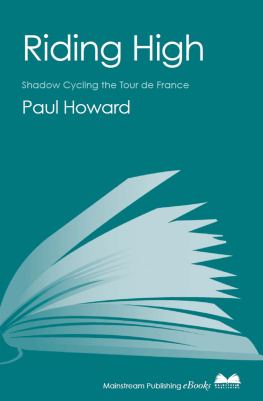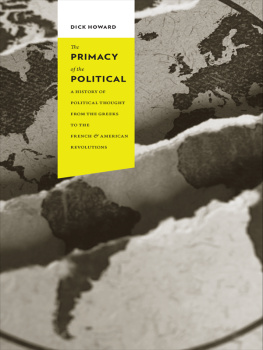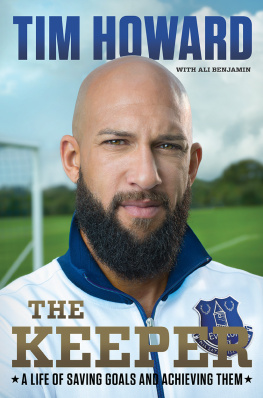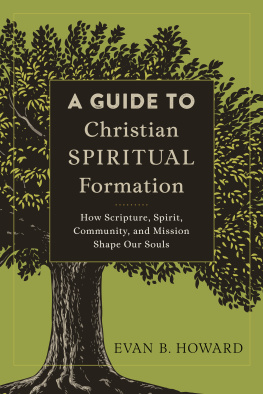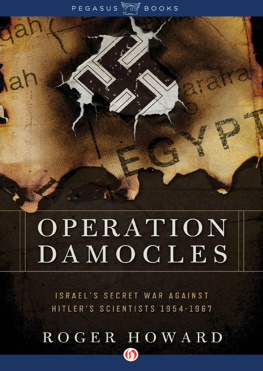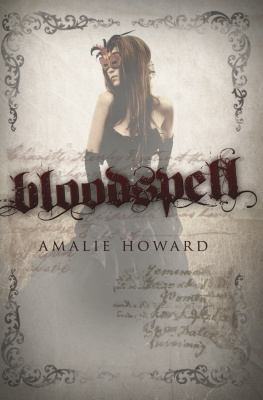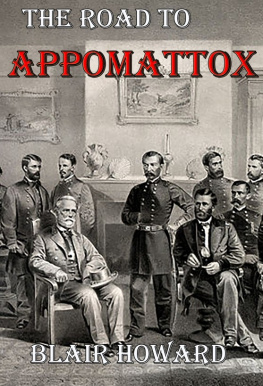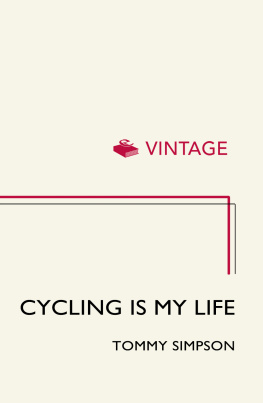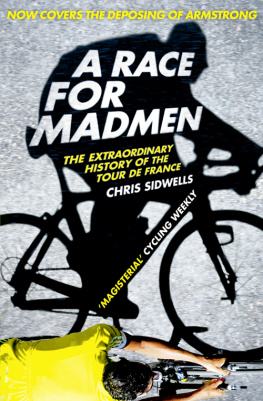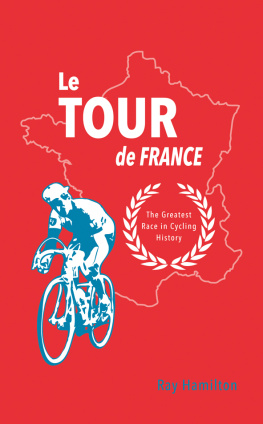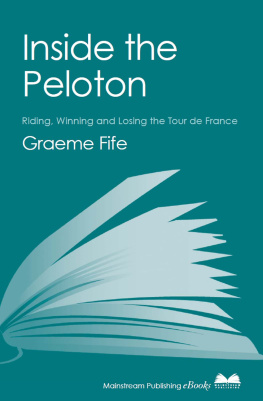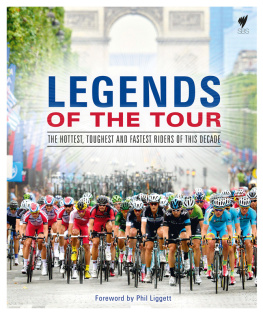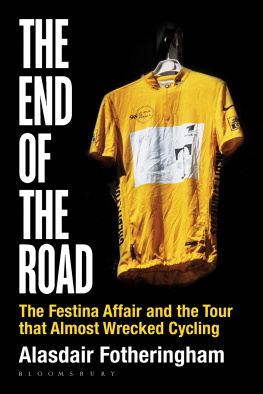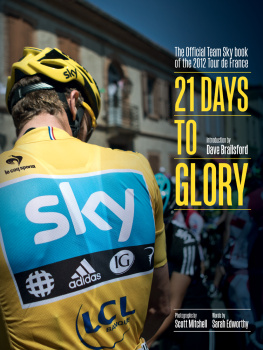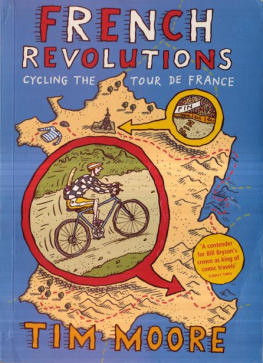RIDING HIGH
SHADOW CYCLING THE TOUR DE FRANCE
Paul Howard
This eBook is copyright material and must not be copied, reproduced, transferred, distributed, leased, licenced or publicly performed or used in any way except as specifically permitted in writing by the publishers, as allowed under the terms and conditions under which it was purchased or as strictly permitted by applicable copyright law. Any unauthorised distribution or use of this text may be a direct infringement of the authors and publishers rights and those responsible may be liable in law accordingly.
Epub ISBN: 9781780570655
Version 1.0
www.mainstreampublishing.com
Copyright Paul Howard, 2003
All rights reserved
The moral right of the author has been asserted
First published in Great Britain in 2003 by
MAINSTREAM PUBLISHING (EDINBURGH) LTD
7 Albany Street
Edinburgh EH1 3UG
ISBN 1 84018 894 4
Reprinted, 2004
No part of this book may be reproduced or transmitted in
any form or by any other means without permission in
writing from the publisher, except by a reviewer who wishes
to quote brief passages in connection with a review written
for insertion in a magazine, newspaper or broadcast.
A catalogue record for this book is available from the British Library
To Molly,
for smiling when I came home
ACKNOWLEDGEMENTS
If Im to start where it all began, the first person to whom I must say a big thank you is Lino Lazzerini in Cavaillon, France, for his enthusiasm and passion for cycling that was just bound to rub off on me. In effect, it was Lino who started the ball rolling 11 years ago. Then theres C.S. Cavaillon, under the stewardship of Guy Chabert (M le President), the club which nurtured my enthusiasm and accommodated a novice English cyclist like it was the most normal thing in the world. I have many fond memories as a result.
It would also be remiss of me not to mention Mmes Lazzerini and Chabert, whose tolerance allowed their respective husbands to spend more time out on the bike with me than perhaps they ought, and who were integral in helping Catherine and me enjoy our stay and feel at home.
Back in the UK, I should thank all the usual suspects at V.C. Etoile for their unqualified support and especially for devising the sweepstake as an extra motivational tool. I just hope they remember how slow I was before I went so that if I start doing well theyll notice the improvement, but if I remain an also-ran their expectations wont have been raised to unrealistic levels.
Thank you also to all those I met en route, who added wholeheartedly, if at times inadvertently, to the experience. I should also thank Stephanie at Giant for arranging the loan of a bike, which made the trip more comfortable than it otherwise might have been.
When it comes to the actual undertaking I must, of course, say a thousand thanks to my support team for the Tour itself. To Paul Grogan, for taking some excellent photos, many of which add greatly to this book, and for providing invaluable assistance and encouragement when riding with me. To Jon Clark, not least for having shared the dream and for having kept me on my mettle through the long winter months of training. To Jon also for having come to provide moral and practical support in spite of suffering the misfortune of not being able to ride with me as planned. To Dad, for undertaking to support me right from the outset and for perceiving this support as an adventure rather than a chore. Without him, none of this would have been possible.
Finally, I must say thank you to Catherine and Molly for coping so admirably with my lapses as a husband and a father that this endeavour has induced.
PREFACE
Eddy Merckx, Lance Armstrong, Paul Howard. If I am to be honest, this is what I would have really liked this book to be about. About how I became the greatest-ever cyclist to come out of the British Isles. About how I became the first British rider to win the Tour de France, and how I earned the right to be spoken of in the same breath as such greats as Merckx and Armstrong.
You can keep Wimbledon and the FA Cup final. Although I used to have the same make of tennis racket as Bjrn Borg and remember being mesmerised by John McEnroes tantrums, becoming the first home-grown player for millions of years to win at the All England club is someone elses dream. As for winning the FA Cup, these days its enough for me to say that Im a fan of Leeds United to understand why that was never a realistic possibility (although I cant deny that the Elland Road faithful chanting my name after I complete my hat-trick against that team from Manchester has a certain appeal).
For me, the greatest sporting dream was to ride, and then win, the Tour de France. The only problem was that I didnt realise the extent of this passion until too late. I was at sixth form before the intrigues and allure of bike racing inspired any real interest. Even then it wasnt for several years until I began to appreciate what was really happening: how Miguel Indurain imposed his will on the Tour for five consecutive years, how his achievements made him into the kind of star I dreamt of being. Now, at the age of 30, it seems to me that I have surely swapped promising for past it.
I say the only problem it is of course not just age that has made the fulfilment of this dream such an impossibility. The biggest obstacle is perhaps the fact that I am nowhere near good enough a cyclist to become a professional. Certainly nowhere near the kind of youthful prodigy needed to make sceptical sponsors from the continent think of recruiting an unknown from a cycling backwater like the UK.
Even if I had the physical ability, which my amateur racing record makes quite clear I dont, my inherent laziness would have scuppered my plans: although Im quite likely to train on a cold, rainy winters day, the warm feeling of self-righteousness this engenders will then probably keep me off the bike for a couple of weeks, often when conditions are more clement.
Added to this I must also confess to the ease with which I can be distracted from my goals. Even when I was racing relatively seriously as an amateur (and occasionally showing signs of some latent ability), Id often lose interest just at the moment when a bit more application might have seen me make some progress. Instead, Id find articles of great interest in the Sunday papers that just had to be read. Or Id surprise my wife with my sudden enthusiasm for family life and domestic chores when for the past two weeks all of these had been subjugated to the needs of my training.
I like to think this is an endearing inability to take things too seriously, although a sports psychologist might demur and point out it could just be me hiding from the fear of failure: if I havent trained that much it doesnt matter if I lose, but if Ive prepared thoroughly and still lose then the blow to the ego will be serious. I think I prefer the first analysis.
Yet in spite of this litany of reasons why I was never going to be the next cycling great, the passion for cycling and the Tour de France has remained. In particular, the physical challenge that the Tour represents has always been compelling. Its been called the toughest sporting event in the world and it is difficult to disagree. Three weeks of riding upwards of 100 miles a day often much farther and sometimes more than 200 miles. Throw in the terrain covered in the Alps and Pyrenees, with climbs to over 2,500 metres in altitude and some more than 15 miles long, and then add the weather the riders are likely to face (from almost unbearable heat in the south to the occasional snow, even in July, of the mountains; from the dismal rain that can plague the north to the strong winds of the west coast) and you begin to have an idea of the scale of the undertaking.

